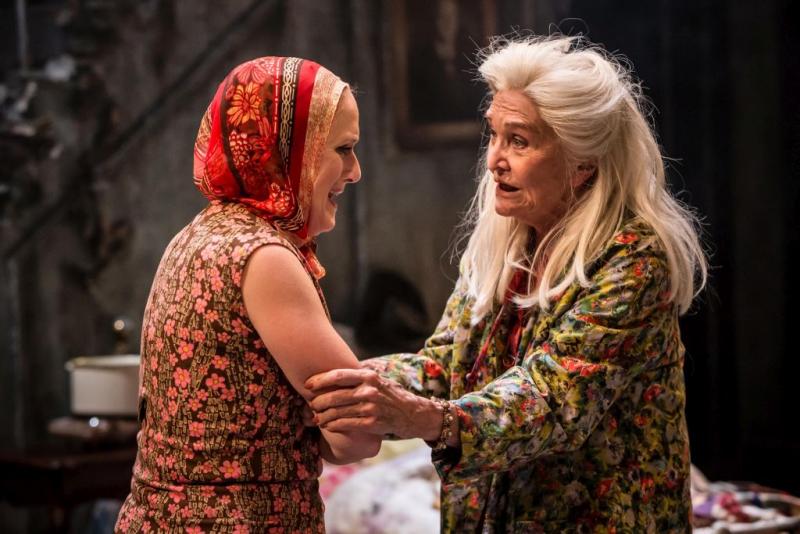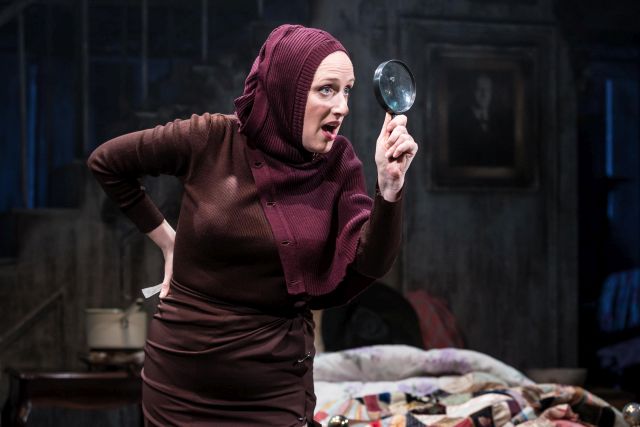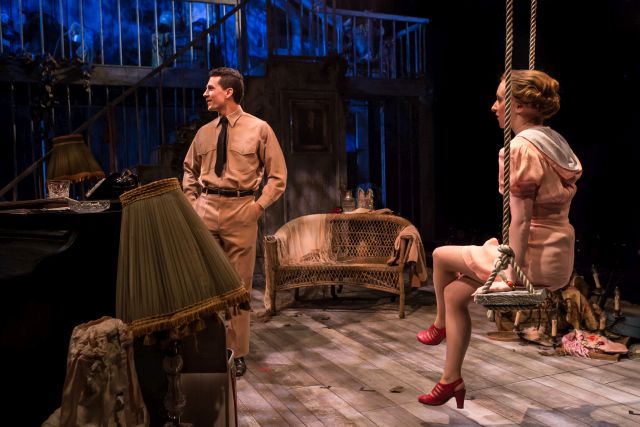Grey Gardens, Southwark Playhouse | reviews, news & interviews
Grey Gardens, Southwark Playhouse
Grey Gardens, Southwark Playhouse
Broadway novelty scores anew in London

One of the more unusual Broadway offerings of recent times crosses the Atlantic with considerable style in an Off West End premiere of 2006 New York entry Grey Gardens that punches well above its weight.
But step back from designer Tom Rogers' cunning scrap heap of a set, and you'll find that composer Scott Frankel and his lyricist Michael Korie and book writer Doug Wright have a lot to say about domestic damage in a show that sometimes suggests Gypsy refracted through the distinctive prism of Mommie Dearest. (One of its oft-repeated phrases, indeed, is "mother darling".) And in a more mainstream show, Jenna Russell's performance would take the town much as Imelda Staunton's Momma Rose did last year. (Russell as the second-act "Little" Edie, pictured below)
 Sure, "Little" Edie Bouvier Beale and her mother, Edith, exert the prurient fascination that comes with watching any grand family in freefall, especially when there's the Kennedy connection to up the gawp-worthy stakes: these women, first presented in the Maysles Brothers' era-defining 1975 documentary of the same title, were the cousin and aunt, respectively, of Jackie Kennedy. The latter indeed appears in the show alongside her sister Lee as an energetic child who gets shooed away when the mother-daughter sniping in her midst begins to build.
Sure, "Little" Edie Bouvier Beale and her mother, Edith, exert the prurient fascination that comes with watching any grand family in freefall, especially when there's the Kennedy connection to up the gawp-worthy stakes: these women, first presented in the Maysles Brothers' era-defining 1975 documentary of the same title, were the cousin and aunt, respectively, of Jackie Kennedy. The latter indeed appears in the show alongside her sister Lee as an energetic child who gets shooed away when the mother-daughter sniping in her midst begins to build.
The documentary, like a later and very fine Jessica Lange/Drew Barrymore TV film that came out after the stage musical, focuses on the two generations of Beale women within the dilapidated environs of Grey Gardens, the East Hampton manse gone to ruin that they shared with various stray cats, raccoons, and the debris that one might expect from two society women of old who long ago ceased to care what the world made of them. (Interestingly, a revival of the musical this past summer, starring Betty Buckley in the role here taken very ably by Sheila Hancock, was staged at a Long Island venue not far from the actual house.)
The abiding conceit of this version of events is to expand upon the well-chronicled portrait of these ladies in decline with a supposition-heavy first act, set at an engagement party in the same house 32 years earlier, so that we see the women in something resembling their prime – though even there, the claws are out, both subtly and not, between the artful saboteur of a mother and a daughter whose interest in performance clearly riles a mother who harboured ambitions of the same. "Save Puccini for the shower," daughter snaps at mother, though what mum ultimately does is far worse in terms of smothering her child's chance to fly the family nest.
Various commentators have asserted that the first act is either altogether superfluous or merely a set-up for the superior post-interval dynamic, which devotees of the film will recognise has been artfully transposed to the stage, key moments from the women's bickering, brio-laden verbal roundelay preserved intact. In fact, the portrait of a party gone spectacularly sour works very well in its own right and allows in practical terms for Russell to dazzle as both mother in act one and her own daughter in act two – a gift of a dual assignment that Russell bats out of the park with the insouciant abandon that in 2007 won Broadway originator Christine Ebersole her second Tony Award.
 First glimpsed as a diva without a proper audience, Russell morphs in act two into a novelty act who seems to delight no one as much as herself, though the actress has great fun working the Southwark audience, as if we were paying private obeisance to a talent that has been unfairly left to languish. (The first act "Little" Edie is played by a wispy-seeming yet strong-voiced Rachel Anne Rayham, pictured above with Aaron Sidwell as the Kennedy that got away, who has something of the gamine quality of her Broadway predecessor, Erin Davie.)
First glimpsed as a diva without a proper audience, Russell morphs in act two into a novelty act who seems to delight no one as much as herself, though the actress has great fun working the Southwark audience, as if we were paying private obeisance to a talent that has been unfairly left to languish. (The first act "Little" Edie is played by a wispy-seeming yet strong-voiced Rachel Anne Rayham, pictured above with Aaron Sidwell as the Kennedy that got away, who has something of the gamine quality of her Broadway predecessor, Erin Davie.)
Russell gets the bulk of a rich and varied score that in the first act neatly fillets several decades of American popular music, from minstrel show-style numbers through to Jerome Kern-worthy trilling and a nod to John Philip Sousa along the way. But the two second-act showstoppers (the much-covered "Another Winter in a Summer Town", preeminently) let this gifted actress let rip, Russell parceling out her talent across differing members of the same family as she did to rending effect some years back as Dot and Marie in Sunday in the Park with George.
Her formidable co-star, Hancock, inhabits the lone part of the Beale matriarch in extremis, presented here as a sharp-tongued, silver-haired harpy who desperately needs the same daughter whom she is quick to deride as a "relic". Ah, families: it was ever thus, right? Except that Grey Gardens' singular achievement is to seem absolutely and bracingly unique.
rating
Buy
Share this article
The future of Arts Journalism
You can stop theartsdesk.com closing!
We urgently need financing to survive. Our fundraising drive has thus far raised £49,000 but we need to reach £100,000 or we will be forced to close. Please contribute here: https://gofund.me/c3f6033d
And if you can forward this information to anyone who might assist, we’d be grateful.

Subscribe to theartsdesk.com
Thank you for continuing to read our work on theartsdesk.com. For unlimited access to every article in its entirety, including our archive of more than 15,000 pieces, we're asking for £5 per month or £40 per year. We feel it's a very good deal, and hope you do too.
To take a subscription now simply click here.
And if you're looking for that extra gift for a friend or family member, why not treat them to a theartsdesk.com gift subscription?
more Theatre
 Troilus and Cressida, Globe Theatre review - a 'problem play' with added problems
Raucous and carnivalesque, but also ugly and incomprehensible
Troilus and Cressida, Globe Theatre review - a 'problem play' with added problems
Raucous and carnivalesque, but also ugly and incomprehensible
 Clarkston, Trafalgar Theatre review - two lads on a road to nowhere
Netflix star, Joe Locke, is the selling point of a production that needs one
Clarkston, Trafalgar Theatre review - two lads on a road to nowhere
Netflix star, Joe Locke, is the selling point of a production that needs one
 Ghost Stories, Peacock Theatre review - spirited staging but short on scares
Impressive spectacle saves an ageing show in an unsuitable venue
Ghost Stories, Peacock Theatre review - spirited staging but short on scares
Impressive spectacle saves an ageing show in an unsuitable venue
 Hamlet, National Theatre review - turning tragedy to comedy is no joke
Hiran Abeyeskera’s childlike prince falls flat in a mixed production
Hamlet, National Theatre review - turning tragedy to comedy is no joke
Hiran Abeyeskera’s childlike prince falls flat in a mixed production
 Rohtko, Barbican review - postmodern meditation on fake and authentic art is less than the sum of its parts
Łukasz Twarkowski's production dazzles without illuminating
Rohtko, Barbican review - postmodern meditation on fake and authentic art is less than the sum of its parts
Łukasz Twarkowski's production dazzles without illuminating
 Lee, Park Theatre review - Lee Krasner looks back on her life as an artist
Informative and interesting, the play's format limits its potential
Lee, Park Theatre review - Lee Krasner looks back on her life as an artist
Informative and interesting, the play's format limits its potential
 Measure for Measure, RSC, Stratford review - 'problem play' has no problem with relevance
Shakespeare, in this adaptation, is at his most perceptive
Measure for Measure, RSC, Stratford review - 'problem play' has no problem with relevance
Shakespeare, in this adaptation, is at his most perceptive
 The Importance of Being Earnest, Noël Coward Theatre review - dazzling and delightful queer fest
West End transfer of National Theatre hit stars Stephen Fry and Olly Alexander
The Importance of Being Earnest, Noël Coward Theatre review - dazzling and delightful queer fest
West End transfer of National Theatre hit stars Stephen Fry and Olly Alexander
 Get Down Tonight, Charing Cross Theatre review - glitz and hits from the 70s
If you love the songs of KC and the Sunshine Band, Please Do Go!
Get Down Tonight, Charing Cross Theatre review - glitz and hits from the 70s
If you love the songs of KC and the Sunshine Band, Please Do Go!
 Punch, Apollo Theatre review - powerful play about the strength of redemption
James Graham's play transfixes the audience at every stage
Punch, Apollo Theatre review - powerful play about the strength of redemption
James Graham's play transfixes the audience at every stage
 The Billionaire Inside Your Head, Hampstead Theatre review - a map of a man with OCD
Will Lord's promising debut burdens a fine cast with too much dialogue
The Billionaire Inside Your Head, Hampstead Theatre review - a map of a man with OCD
Will Lord's promising debut burdens a fine cast with too much dialogue

Add comment